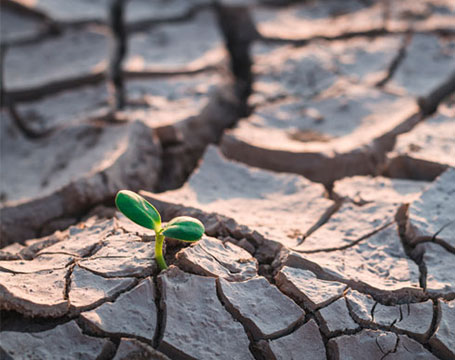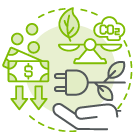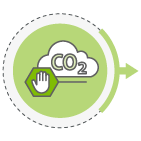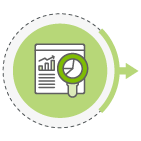To transition to a low-carbon operation, we need to make substantial and sustained reductions in the greenhouse gas emissions produced by our various operations.
In this area, in 2022, we prepared a roadmap comprising the following areas:
- Investment in renewable energy
- Electrically powered mine trucks
- Fuel substitution in freight locomotives and electrically powered yard locomotives
- Energy efficiency in our operations
- Nature-based solutions
- Emissions reductions in our value chain
Also in 2022, our renewable energy projects and energy efficiency prevented the emission of approximately 758,000 tons CO2e, projects like our El Retiro Wind Farm, and cogeneration projects and purchase hydroelectric power.
Additionally, our reforestation programs have contributed to reducing our carbon footprint, reforesting approximately 4,084 acres (1,653 hectares) with native plants.
Energy Management Program
In the Infrastructure Division, we established the Energy Efficiency department pursuing the optimization of our site’s consumption patterns. Our commitment to shaping a sustainable business environment nourishes the importance of the projects evaluated by this team in the consolidation of Grupo México’s Decarbonization Strategy.
We have developed and implemented an energy efficiency tool across several segments of our businesses. This tool aims to establish baselines on which we measure, verify, and report the progress of energy, cost, and emissions savings projects. In this initial phase, we monitor electrical consumption in our operations to then explain their behavior with variables such as their production or occupancy and thus identify specific areas of opportunity for continuous improvement. Analyzing these measured values also allows us to standardize energy consumption KPIs, while information repositories are created within the tool to facilitate consultation from any interested area.
Energy Efficiency team evaluates, proposes, and ensures the execution of projects in coordination with Maintenance, Operation, and Climate Change departments. Currently, we have begun prospecting initiatives in Real Estate, Electricity Generation, O&G Platforms, Highways, and Mining operations. Energy efficiency solutions proposed for these lines of business include options for correcting low Power Factor, foster on-site renewable generation, reduce thermal load inefficiencies, equipment start-stop optimization, and awareness campaigns for the responsible use of our resources. For example, in collaboration with the Mining Division, we developed a project to replace diesel with solar energy in our electro-winning (SX-EW) operations at La Caridad mine (see page 257 of our 2023 sustainability report).
As a next step, we will incorporate the management of other energy resources, such as fossil fuels, to further contribute to our decarbonization goals. This approach will allow us to extend our Energy Management System across all Grupo México operations.


















































